Herb Brody in Nature:
 Sad times are inevitable, and most people eventually rally. But clinical depression is different, and more brutal. All sense of well-being evaporates; life can seem not worth the trouble. According to one estimate, more than 60% of people worldwide who have attempted suicide have a depressive disorder (S. Borentain et al. BMC Psychiatry 20, 384; 2020). Antidepressant drugs are commonly prescribed as treatment, but none is universally helpful. Other types of therapy are beginning to enter the scene, from psychedelic compounds such as psilocybin to implanted devices that zap the brain with pulses of electricity.
Sad times are inevitable, and most people eventually rally. But clinical depression is different, and more brutal. All sense of well-being evaporates; life can seem not worth the trouble. According to one estimate, more than 60% of people worldwide who have attempted suicide have a depressive disorder (S. Borentain et al. BMC Psychiatry 20, 384; 2020). Antidepressant drugs are commonly prescribed as treatment, but none is universally helpful. Other types of therapy are beginning to enter the scene, from psychedelic compounds such as psilocybin to implanted devices that zap the brain with pulses of electricity.
The causes of depression are manifold and complex. But biologically definable factors are starting to come to light. One theory that is gaining support is that the culprit might be a slowdown in nerve growth — meaning that measures that encourage neurons to form could help to keep depression at bay. Obesity has been found to be both a cause and a consequence of depression in a vicious circle.
More here.
